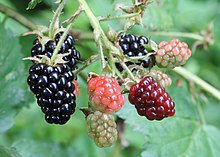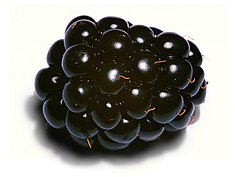Blackberry bush
| Blackberry | |
|---|---|
 |
|
| Ripe, ripening, and unripe blackberries, of an unidentified blackberry species
|
|
| Scientific classification | |
| Kingdom: | Plantae |
| (unranked): | Angiosperms |
| (unranked): | Eudicots |
| (unranked): | Rosids |
| Order: | Rosales |
| Family: | Rosaceae |
| Genus: | Rubus |
| Subgenus: | Rubus (formerly Eubatus) |
| Species | |
And hundreds more microspecies |
|

|
|
| Nutritional value per 100 g (3.5 oz) | |
|---|---|
| Energy | 180 kJ (43 kcal) |
|
9.61 g
|
|
| Sugars | 4.88 g |
| Dietary fiber | 5.3 g |
|
0.49 g
|
|
|
1.39 g
|
|
| Vitamins | |
| Vitamin A | 214 IU |
| Thiamine (B1) |
(2%)
0.020 mg |
| Riboflavin (B2) |
(2%)
0.026 mg |
| Niacin (B3) |
(4%)
0.646 mg |
| Vitamin B6 |
(2%)
0.030 mg |
| Folate (B9) |
(6%)
25 μg |
| Vitamin C |
(25%)
21.0 mg |
| Vitamin E |
(8%)
1.17 mg |
| Vitamin K |
(19%)
19.8 μg |
| Minerals | |
| Calcium |
(3%)
29 mg |
| Iron |
(5%)
0.62 mg |
| Magnesium |
(6%)
20 mg |
| Phosphorus |
(3%)
22 mg |
| Potassium |
(3%)
162 mg |
| Sodium |
(0%)
1 mg |
| Zinc |
(6%)
0.53 mg |
|
|
|
|
|
| Percentages are roughly approximated using US recommendations for adults. Source: USDA Nutrient Database |
|

And hundreds more microspecies
(the subgenus also includes the dewberries)
The blackberry is an edible fruit produced by many species in the Rubus genus in the Rosaceae family, hybrids among these species within the Rubus subgenus, and hybrids between the Rubus and Idaeobatus subgenera. The taxonomy of the blackberries has historically been confused because of hybridization and apomixis, so that species have often been grouped together and called species aggregates. For example, the entire subgenus Rubus has been called the Rubus fruticosus aggregate, although the species R. fruticosus is considered a synonym of R. plicatus.
What distinguishes the blackberry from its raspberry relatives is whether or not the torus (receptacle or stem) "picks with" (i.e., stays with) the fruit. When one picks a blackberry fruit, the torus does stay with the fruit. With a raspberry, the torus remains on the plant, leaving a hollow core in the raspberry fruit.
The term bramble, a word meaning any impenetrable , has traditionally been applied specifically to the blackberry or its products, though in the United States it applies to all members of the Rubus genus. In the western US, the term caneberry is used to refer to blackberries and raspberries as a group rather than the term bramble.
...
Wikipedia
